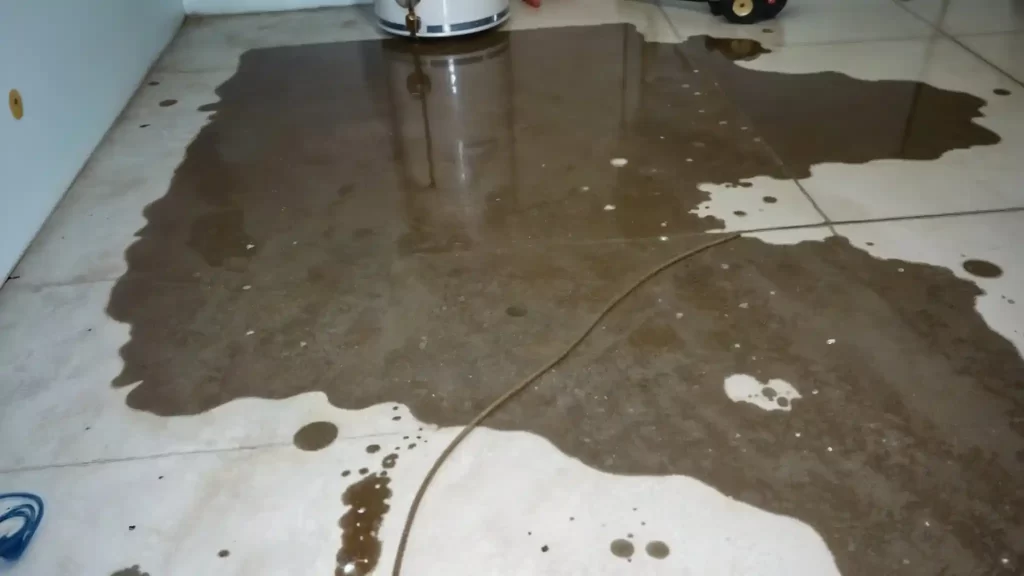If you’ve ever noticed damp spots, puddles, or a musty odor in your basement, you’re not alone. Water seepage through basement floors is one of the most common homeowner headaches — and one of the most damaging if left unchecked. It can weaken your foundation, promote mold growth, and ruin valuable possessions stored below ground level. But understanding why water finds its way into your basement is the first step toward a lasting solution.

In this article, we’ll break down the causes of basement floor leaks, the warning signs to watch for, and — most importantly — how to stop them for good. And when the damage has already begun, calling in professionals like Semper Fi, the premier water damage restoration company, can make all the difference in restoring your home’s safety and peace of mind.
The Real Reasons Water Seeps Through Basement Floors
Basement water problems don’t happen overnight. They’re usually the result of long-term issues with drainage, hydrostatic pressure, or foundation integrity. Let’s look at the main culprits.
1. Hydrostatic Pressure
The most common cause of water seeping through basement floors is hydrostatic pressure — the force exerted by groundwater pushing against your foundation. When the soil around your home becomes saturated (especially during heavy rain or snowmelt), water looks for the path of least resistance. Cracks, joints, or even porous concrete floors can become gateways for that moisture to push through.
2. Poor Drainage Around the Home
If your property’s grading slopes toward your home rather than away from it, rainwater naturally collects around your foundation. Combine that with clogged gutters or downspouts that don’t direct water far enough away, and you have a recipe for persistent seepage.
3. Cracks in the Foundation or Floor
Over time, concrete can shrink, settle, or crack — especially if your foundation wasn’t properly waterproofed. Even hairline fractures can allow groundwater to slowly infiltrate your basement floor. Once moisture gets in, it can widen those cracks further as it freezes and thaws through the seasons.
4. High Water Table
In some areas, the natural water table sits very close to the surface. When the water table rises — particularly after prolonged rainfall — it can exceed the level of your basement floor. Without a proper waterproofing system in place, water can easily find its way up through the slab.
5. Failed or Missing Drain Tile System
Homes built without a drain tile system (or with one that’s clogged or collapsed) are especially prone to water seepage. A drain tile, also known as a perimeter drain, is designed to capture groundwater and direct it safely away from your foundation. If it’s not functioning properly, water pressure builds and forces its way in.
Warning Signs of Basement Water Seepage
Catching water problems early can save you thousands in repair costs. Keep an eye out for these signs:
- Damp or discolored patches on the basement floor
- Musty or moldy odors
- White, chalky residue (efflorescence) on walls or floors
- Cracked or flaking concrete
- Mold or mildew growth along floor edges
- Rust on appliances or furniture stored in the basement
If any of these issues sound familiar, it’s time to take action before the problem worsens.
How to Stop Water from Seeping Through Basement Floors
The right solution depends on the cause of the seepage, but lasting results require addressing both the symptom (the moisture) and the source (the water entry point). Here are proven methods to permanently stop basement floor leaks.
1. Improve Exterior Drainage
Start with the basics: ensure your yard slopes away from your home. Extend downspouts at least 6–10 feet from your foundation and clean gutters regularly. Even small improvements can dramatically reduce how much water collects around your basement walls.
2. Repair Foundation Cracks
Professional foundation repair specialists can inject cracks with epoxy or polyurethane foam to seal them permanently. For larger structural cracks, additional reinforcement or underpinning may be necessary.
3. Install or Repair a Drain Tile System
If your home doesn’t already have one, a drain tile system is a must-have. It collects groundwater before it reaches your basement and channels it into a sump pit. From there, a sump pump ejects the water safely outside your home.
4. Add an Interior Waterproofing Membrane
In cases where exterior excavation isn’t practical, applying a waterproof coating or membrane to the inside of basement walls and floors can provide an effective moisture barrier. This method stops water from entering the living space even if it still seeps through the outer wall.
5. Install a Sump Pump
A sump pump is your last line of defense against flooding. When water collects under your basement floor, the pump automatically activates and pushes it out through a discharge line. Modern systems even include battery backups, ensuring protection during power outages.
6. Dehumidify and Maintain Airflow
Even after structural fixes, humidity control is key. A dehumidifier will help maintain healthy air quality and prevent mold regrowth. Keep storage items off the floor and use shelving to allow airflow around walls.
Why You Should Call Semper Fi — The Water Damage Experts
When water seeps through your basement floor, fast action is essential. That’s where Semper Fi comes in. As the premier water damage restoration company, Semper Fi specializes in identifying the root cause of water intrusion and implementing long-term solutions to protect your home.
Their certified technicians use advanced moisture detection tools, industrial-grade drying systems, and professional-grade waterproofing materials. Whether you’re dealing with an active leak, storm-related flooding, or persistent dampness, Semper Fi’s experts handle the cleanup, drying, and restoration — leaving your basement dry, safe, and mold-free.
Beyond immediate restoration, Semper Fi focuses on prevention. Their comprehensive waterproofing services and maintenance programs ensure that once the problem is fixed, it stays fixed. That’s why homeowners across the region trust Semper Fi not just to repair water damage, but to prevent it from ever returning.
Final Thoughts
Water seeping through your basement floor isn’t just a nuisance — it’s a warning sign. Left untreated, it can compromise your home’s structure, lower its value, and pose health risks. By understanding the causes and taking proactive steps — from proper drainage and crack repair to professional waterproofing — you can keep your basement permanently dry.
And when you need trusted, proven help, Semper Fi stands ready. With expert restoration, thorough waterproofing, and unmatched customer service, they’re your partner in keeping your home protected — for good.
FAQ
1. Why is water seeping through my basement floor?
Water seeps through basement floors when groundwater builds up around your foundation, creating hydrostatic pressure. This pressure forces water through small cracks, joints, or porous concrete. Common causes include poor exterior drainage, a high water table, or a failed drain tile system. Over time, even minor moisture issues can turn into serious flooding or foundation problems.
2. How can I tell if water is coming up through my basement floor or walls?
Water coming up through the floor usually appears as damp spots or puddles in the center of the room, especially after rain. In contrast, leaks from walls tend to leave streaks, bubbling paint, or wet spots near the base of the wall. If you’re unsure, a professional moisture inspection from Semper Fi can pinpoint the exact entry points using advanced detection tools.
3. What damage can basement water seepage cause?
Persistent water seepage can lead to structural damage, mold growth, and unhealthy indoor air quality. Over time, the concrete can deteriorate, reinforcing steel may rust, and mold spores can spread through your HVAC system. This not only affects your home’s integrity but can also pose health risks to your family.
4. Can I fix basement water seepage myself?
Minor moisture issues — such as cleaning gutters, extending downspouts, or sealing small cracks — can sometimes be handled DIY. However, if you notice ongoing dampness, standing water, or musty odors, you’ll likely need professional help. Semper Fi’s certified technicians can assess your foundation, identify the source of water intrusion, and implement long-lasting waterproofing solutions.
5. How do professionals stop water from coming through basement floors?
Professionals like Semper Fi use a combination of methods tailored to your home’s specific issue. These may include installing or repairing drain tile systems, sealing foundation cracks with epoxy injections, applying waterproof coatings, and setting up sump pumps with battery backups. The goal is not just to dry your basement temporarily, but to eliminate the problem permanently.
6. What is a drain tile system, and how does it help prevent water seepage?
A drain tile system (also called a French drain or perimeter drain) is a network of perforated pipes installed around your foundation. It collects groundwater before it reaches your basement and directs it into a sump pit. From there, a sump pump discharges the water safely outside. This system relieves hydrostatic pressure and is one of the most effective long-term waterproofing solutions.
7. Will sealing my basement floor stop the water?
Sealing can help reduce moisture but rarely solves the problem by itself. If water pressure beneath your floor remains high, it will eventually find another path in — often through wall-floor joints or cracks. The best approach combines proper exterior drainage, foundation repair, and professional waterproofing services like those offered by Semper Fi.
8. How much does it cost to waterproof a basement?
The cost varies depending on the size of your basement, the extent of water damage, and the methods needed. Minor crack sealing might cost a few hundred dollars, while a full waterproofing system could range from $3,000 to $10,000 or more. Semper Fi offers free assessments and transparent estimates, ensuring you understand every step before work begins.
9. Is waterproofing a basement a permanent solution?
When done professionally, yes. A comprehensive system that includes drainage correction, sump pump installation, and crack repair can permanently prevent future seepage. Semper Fi specializes in long-term waterproofing solutions backed by warranties, ensuring your basement stays dry year-round.
10. What should I do if I already have water damage in my basement?
Act fast! Start by removing valuables from the area and avoiding electrical outlets near the water. Then, call Semper Fi, the leading water damage restoration company. Their team will extract standing water, thoroughly dry the space, disinfect affected materials, and repair any structural damage. Quick professional response can prevent costly mold remediation later on.


